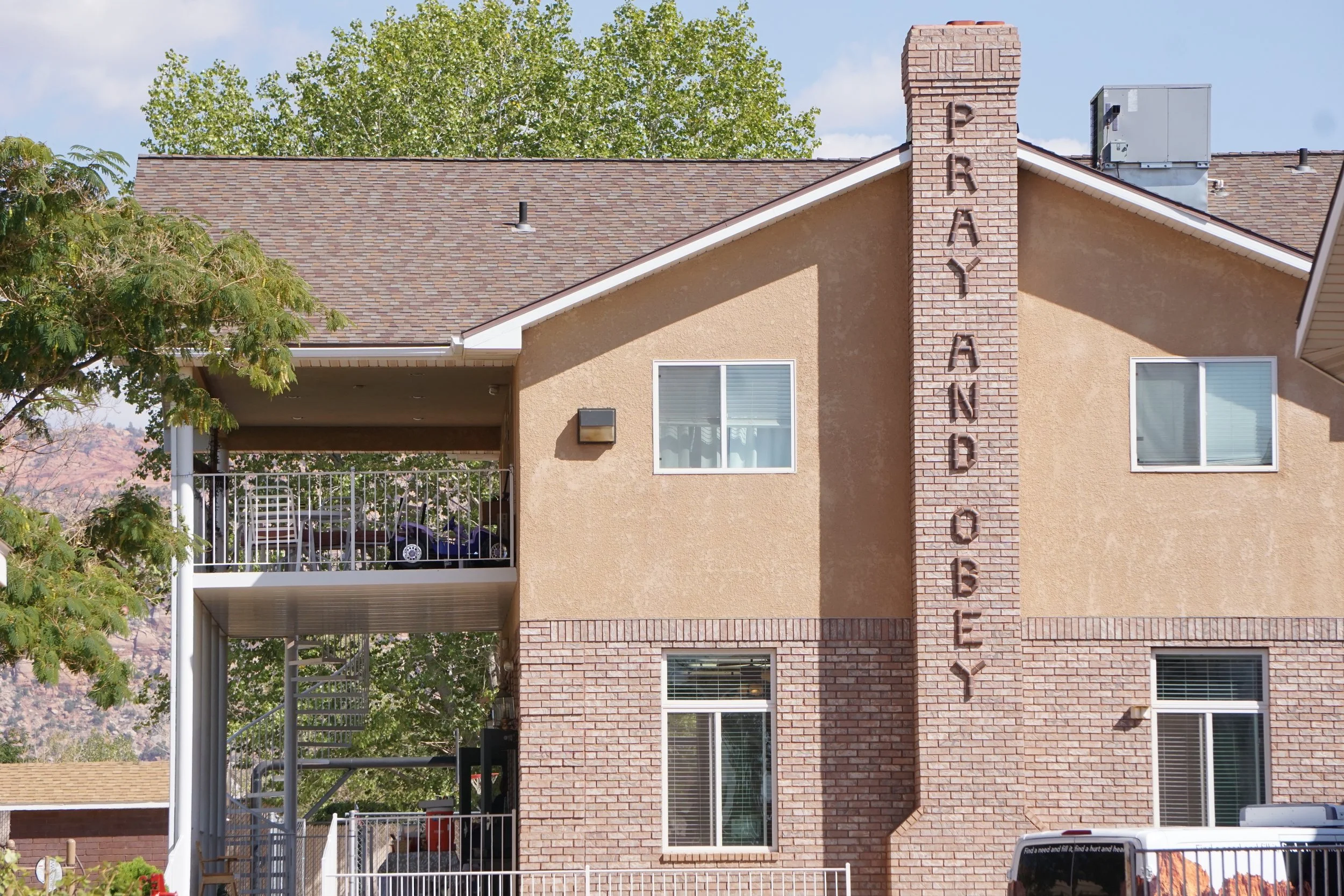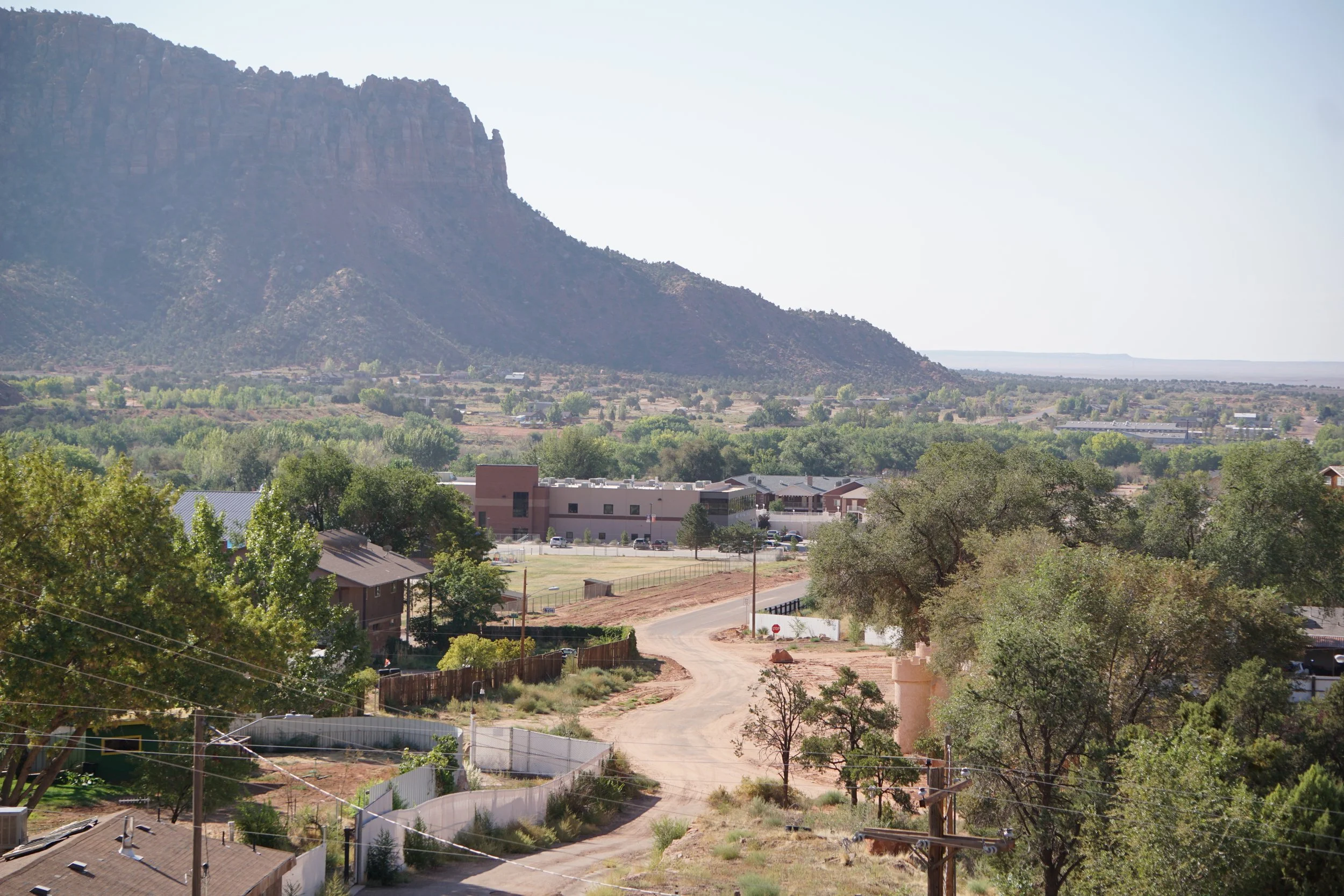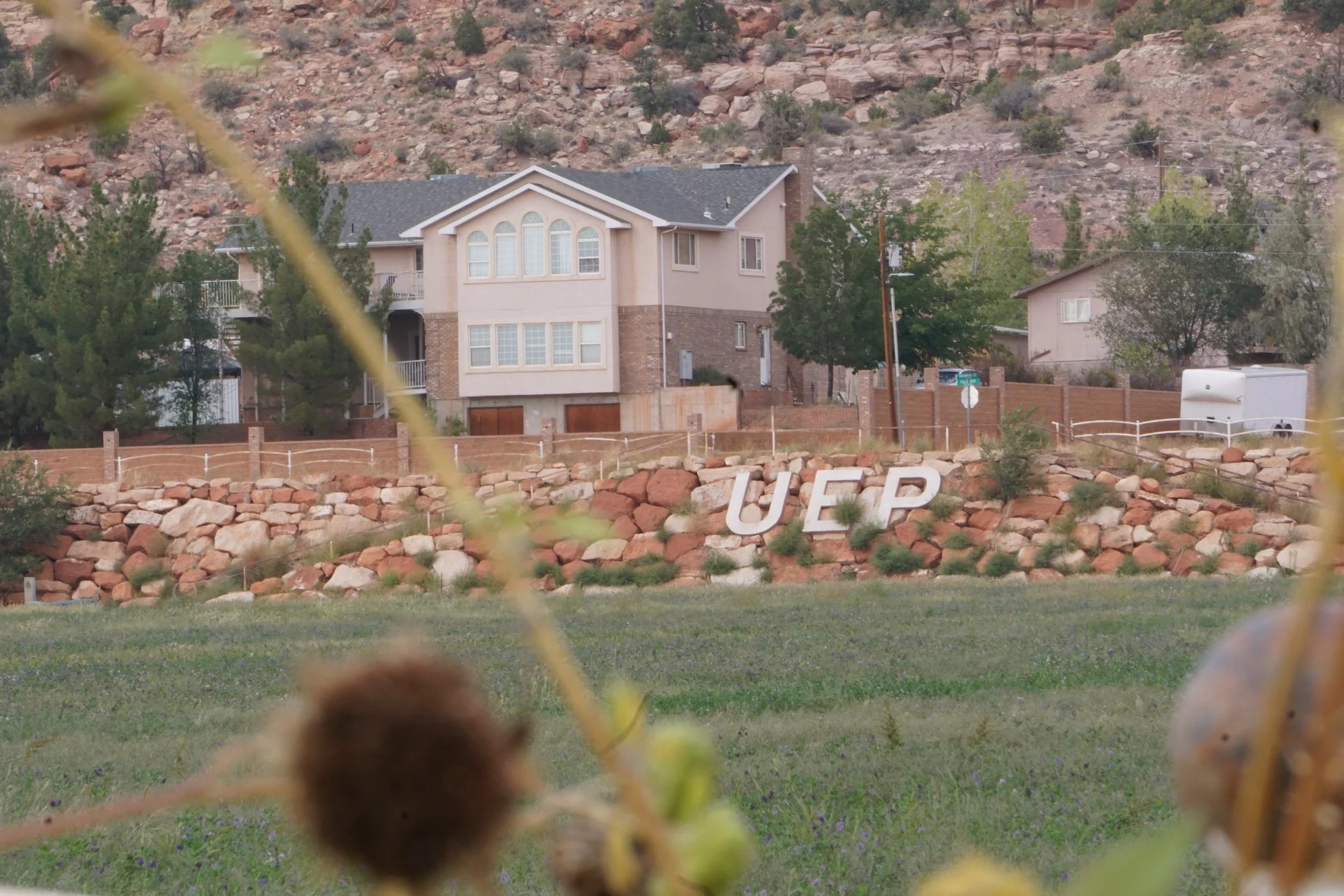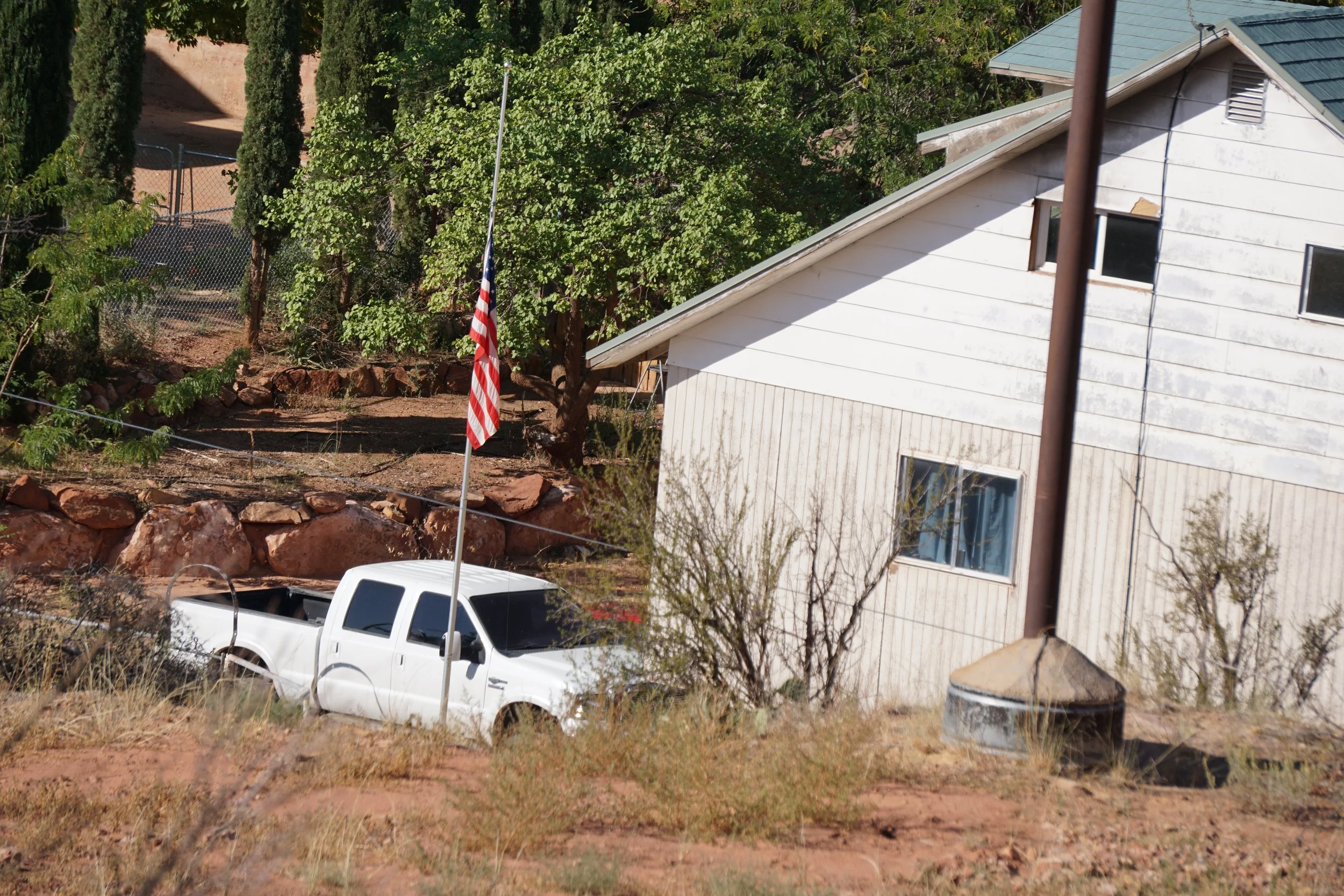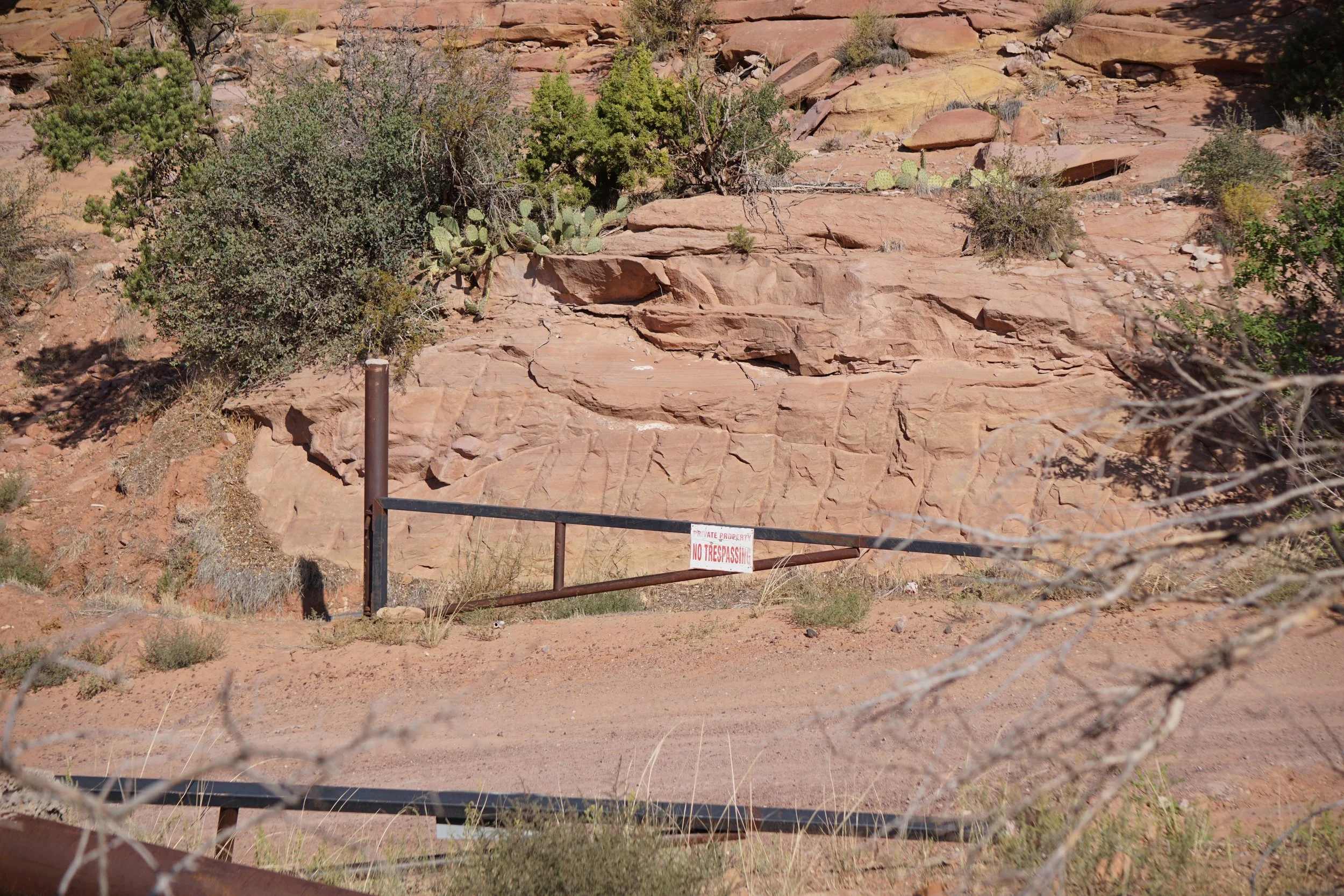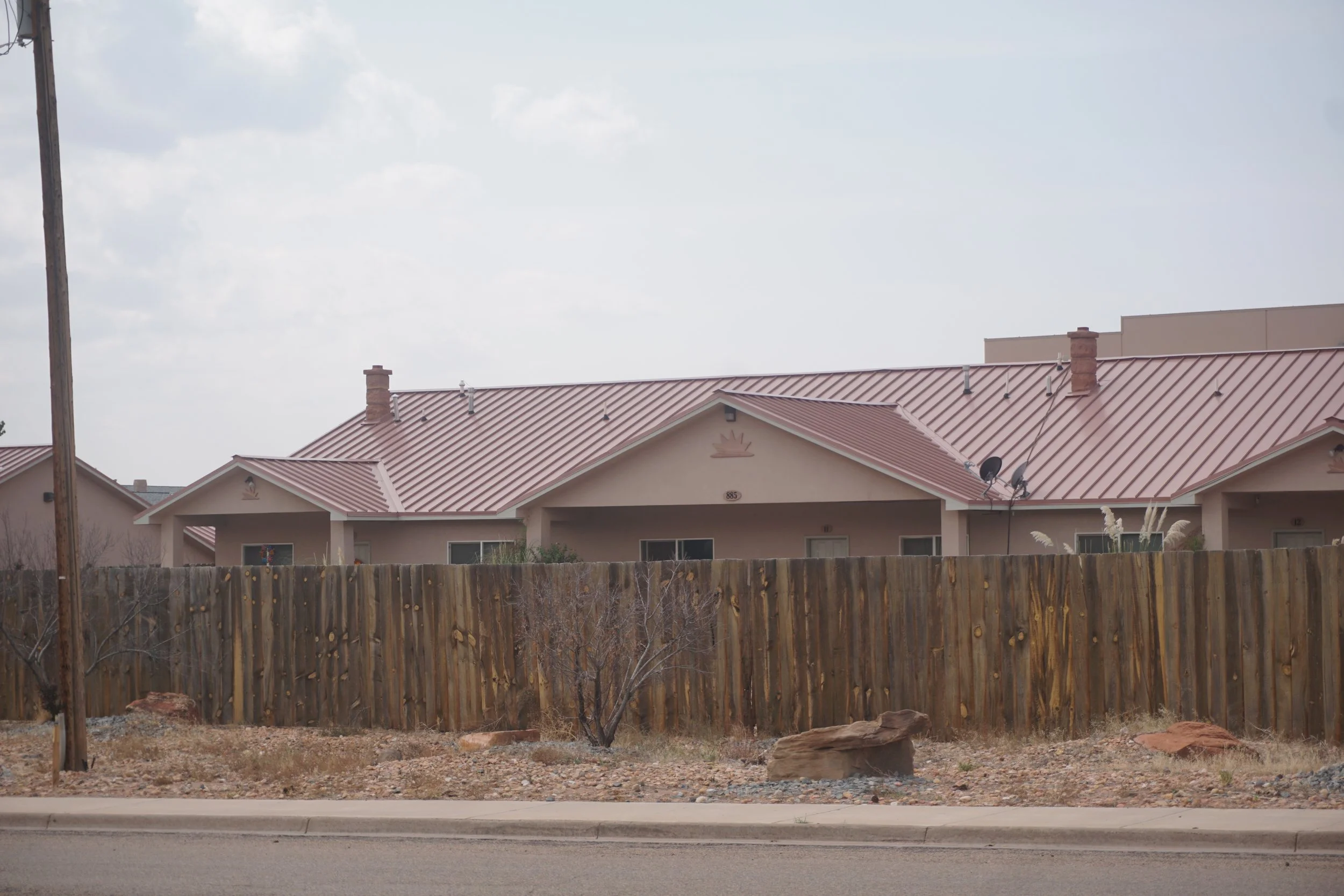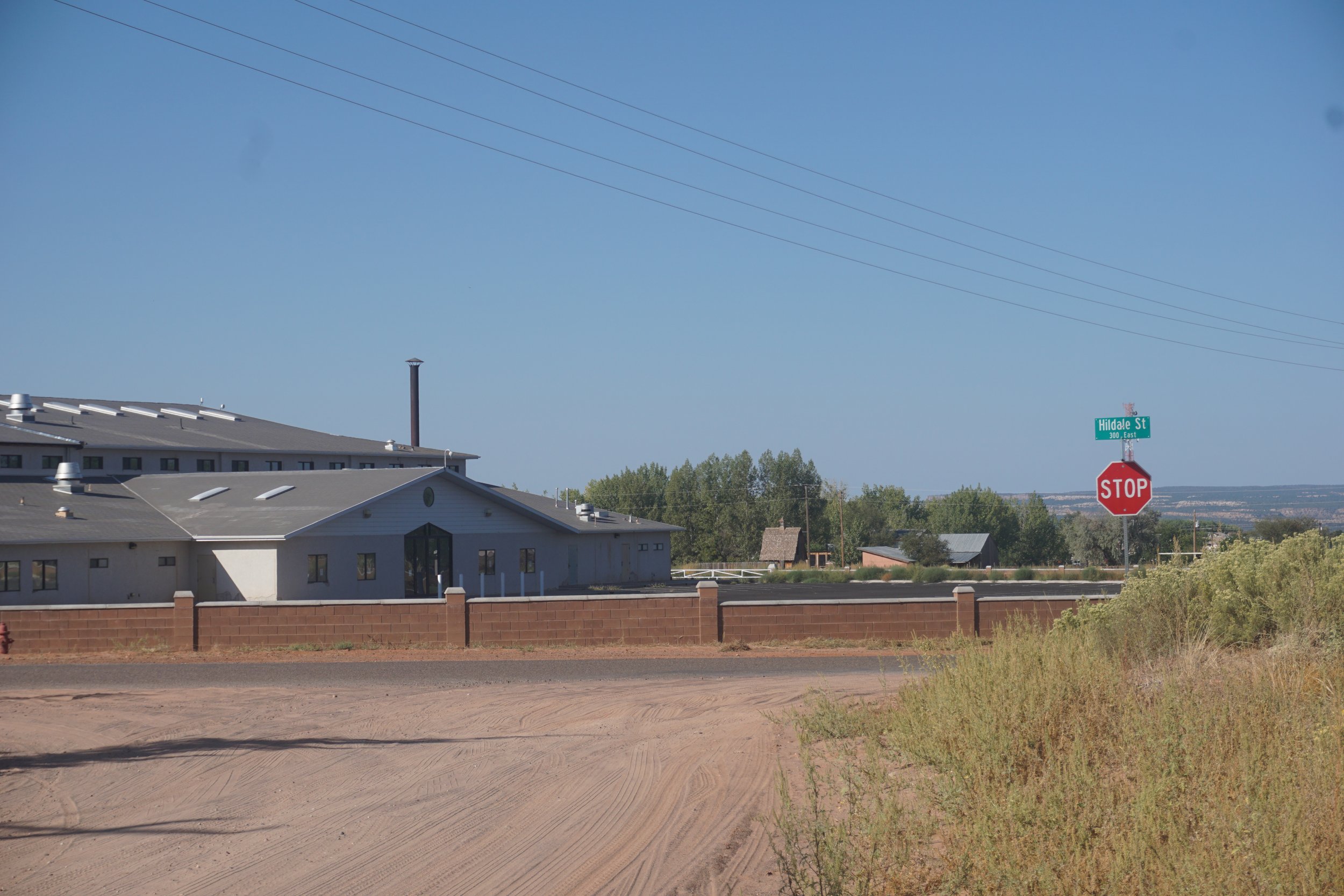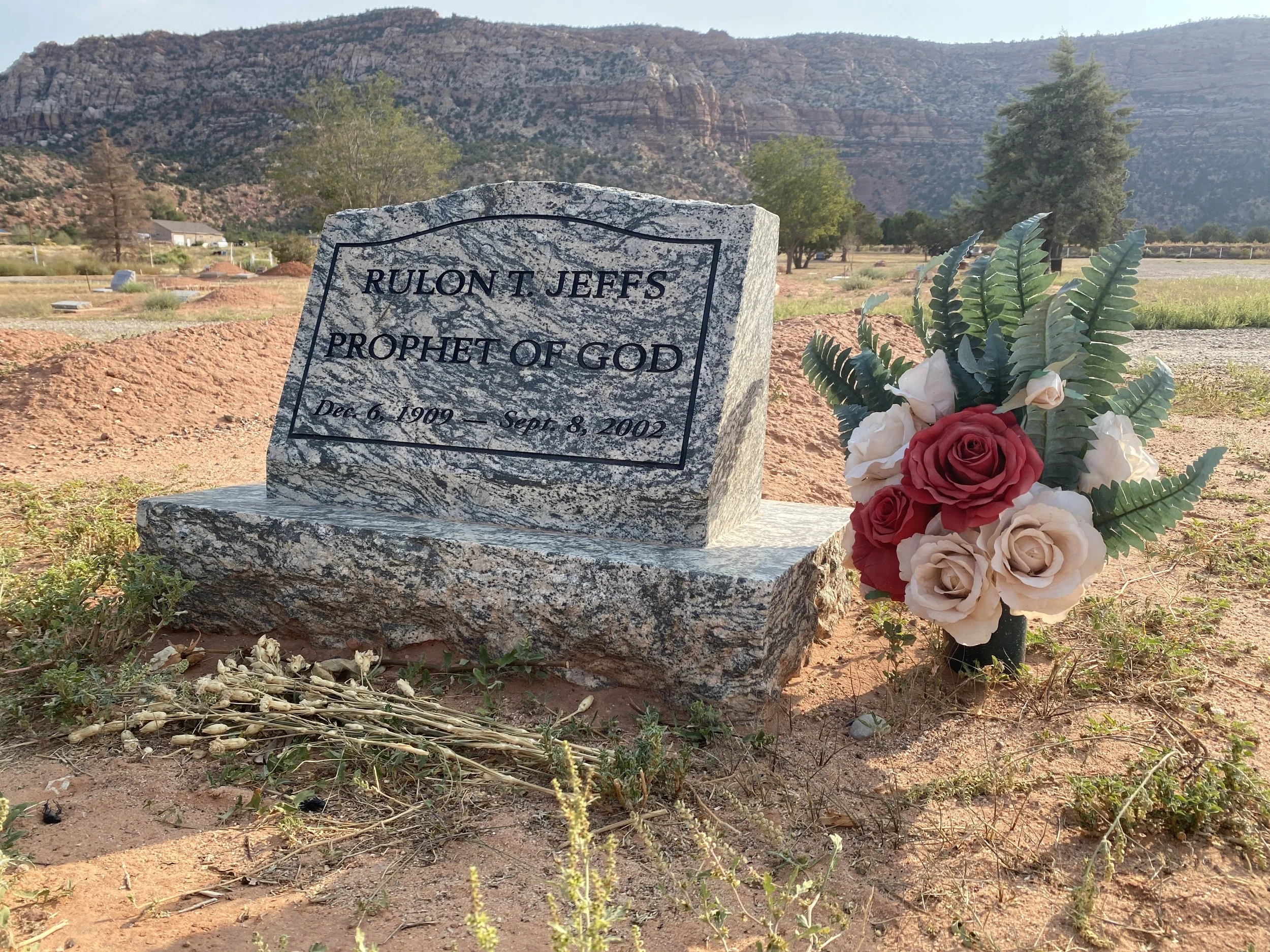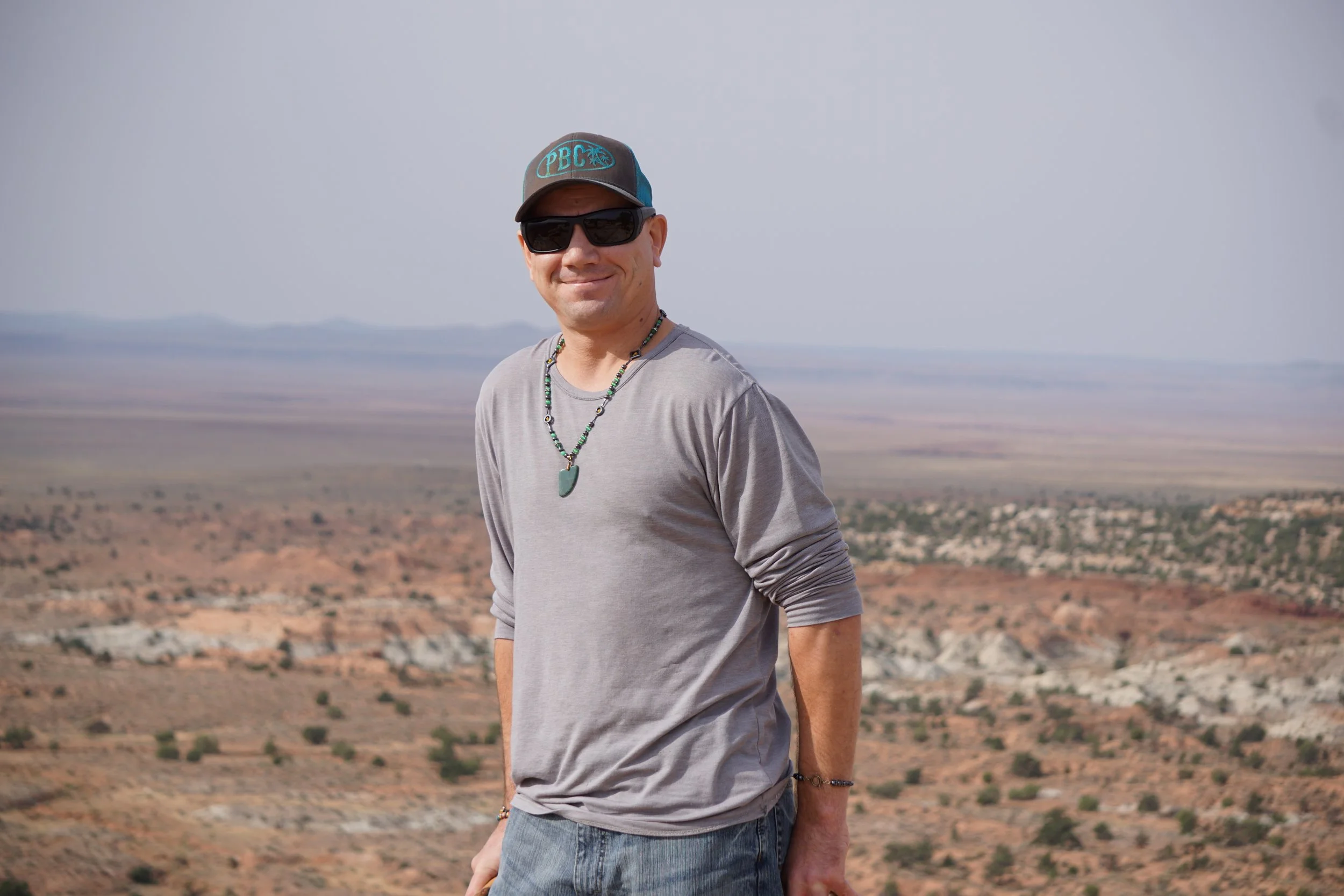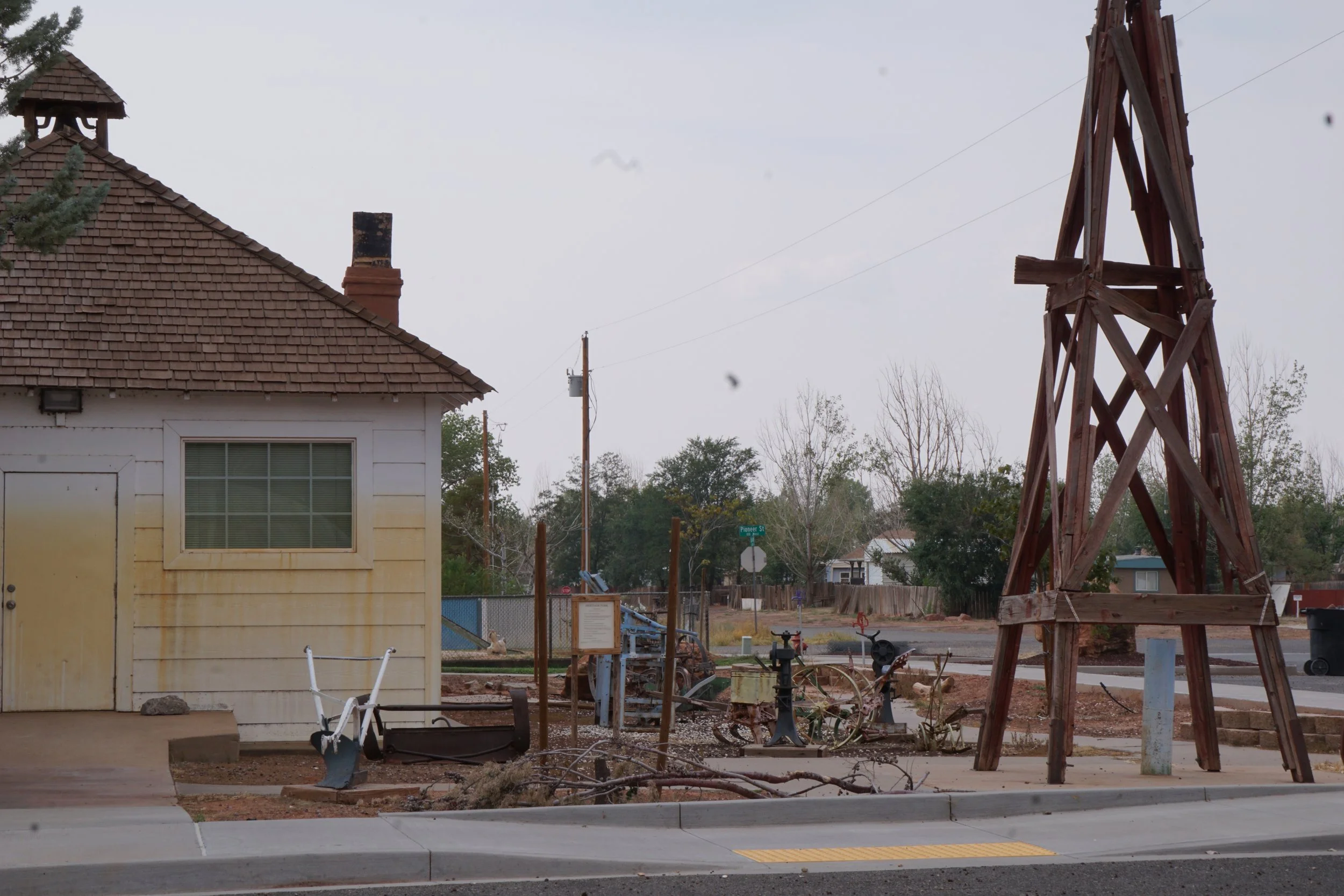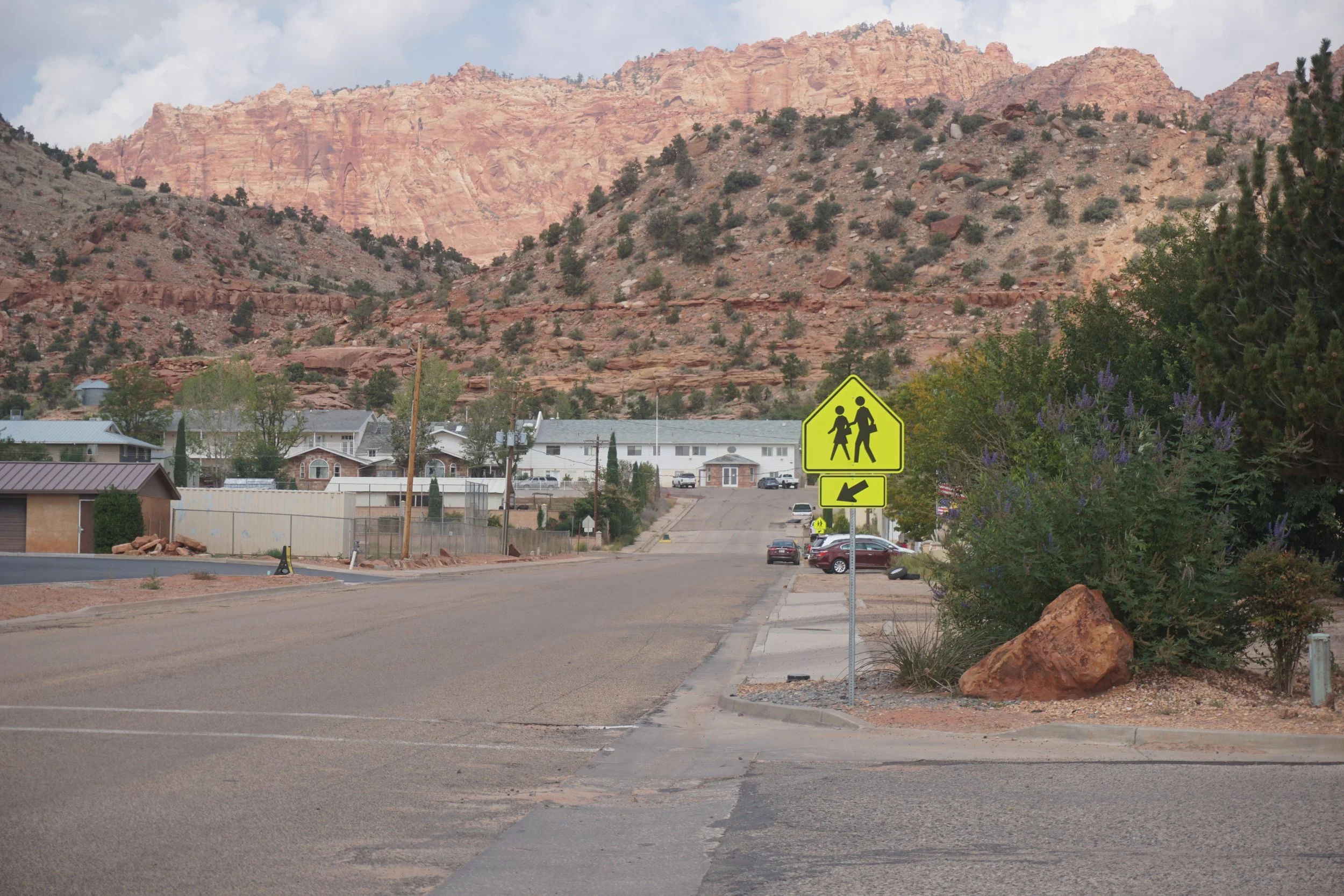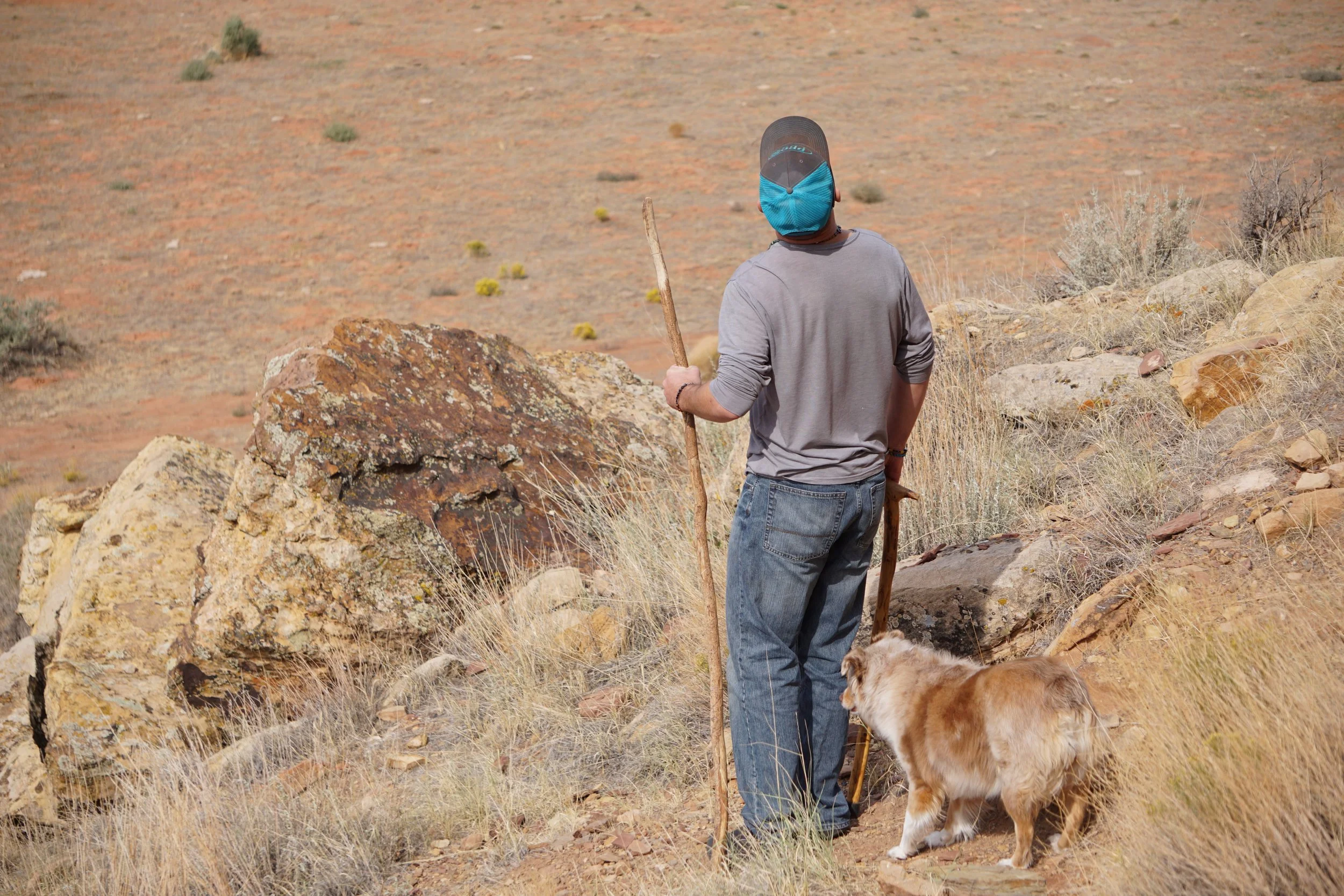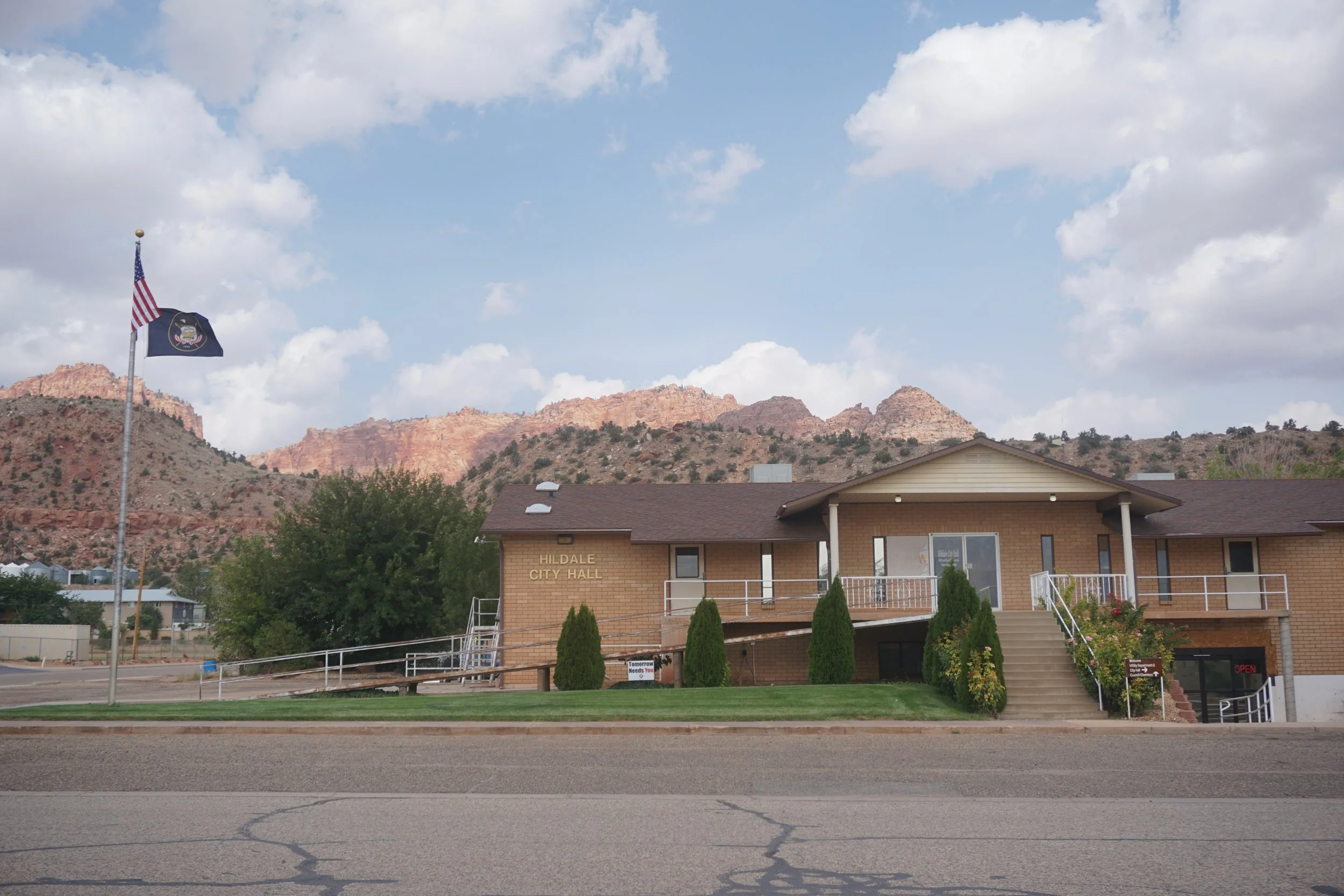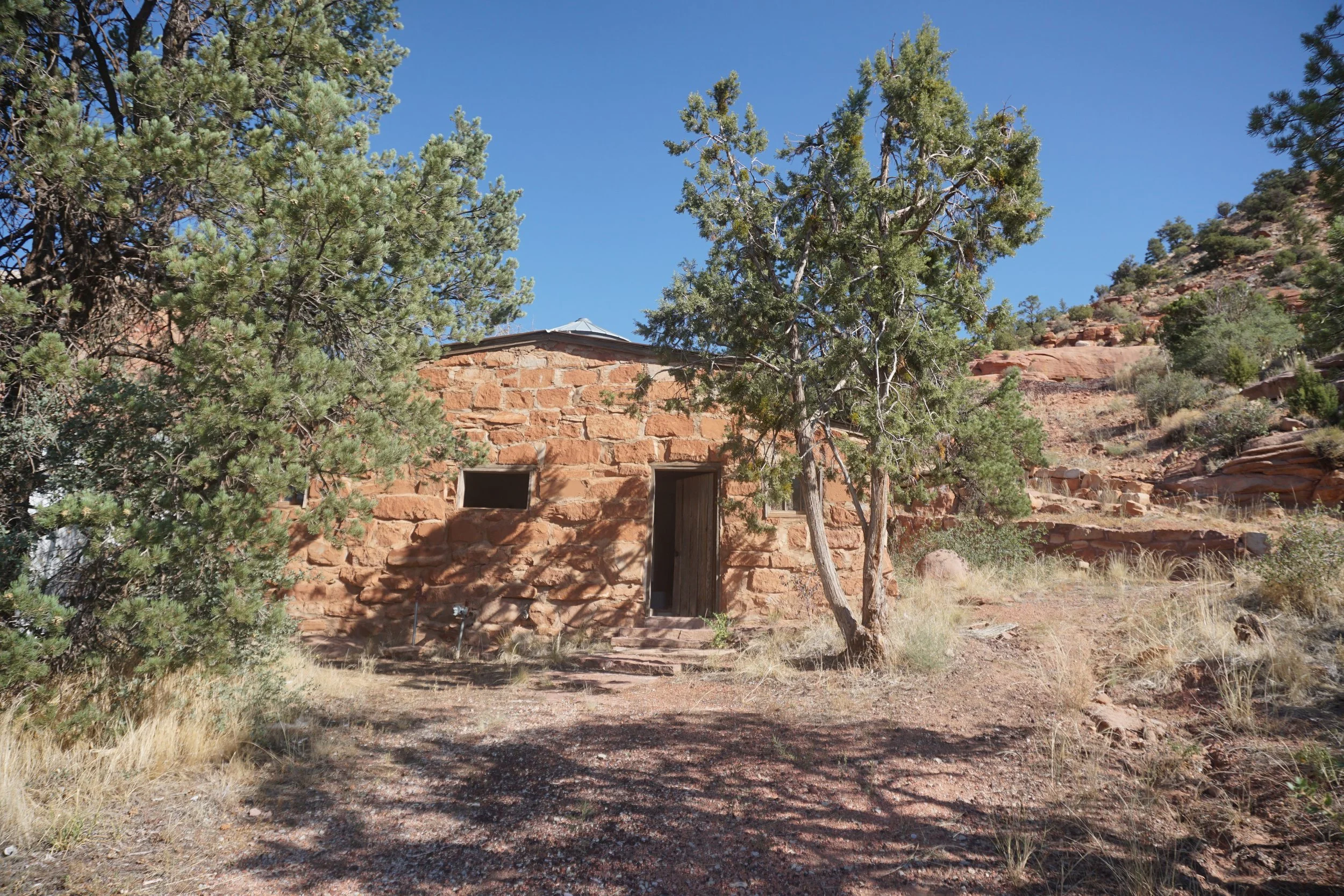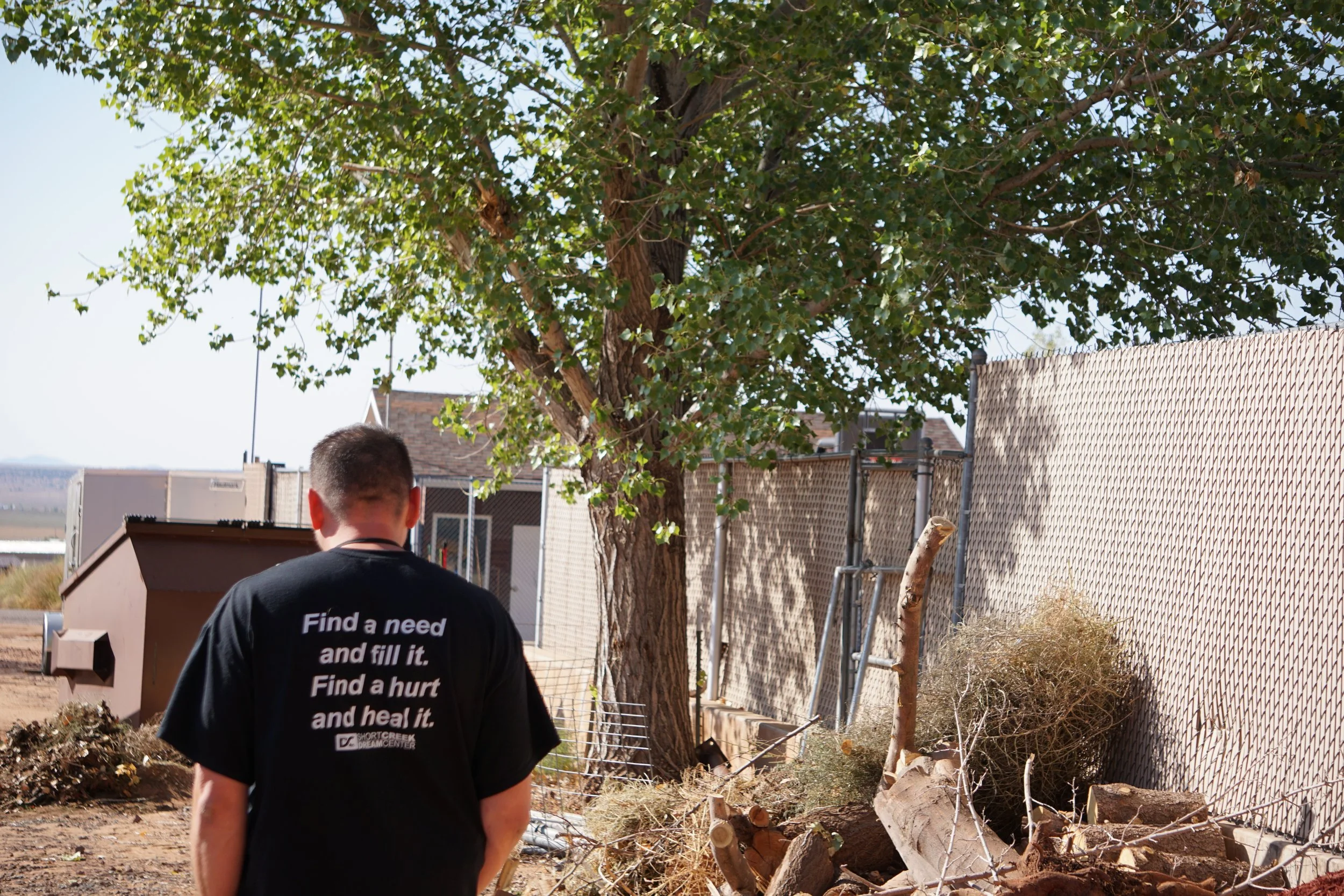Saint Jeff’s Twin Cities
Story and Photography by Alizée Chaudey
This investigative piece was written as part of my master’s thesis for the University of Miami.
The words ‘Pray and Obey’ adorn the walls of Warren Jeff’s old compound. The building is today Hildale’s Dream Center.
Collectively known as Short Creek, the twin cities of Hildale, Utah, and Colorado City, Arizona sit at the bottom of the Canaan Mountain’s vermillion cliffs. Tucked away along the Arizona strip, from the North Rim of the Grand Canyon to Zion’s peaks, this isolated wedge of backcountry is protected on all fronts by formidable natural barriers. But despite being in Zion National Park’s backyard, the Creek doesn’t get many tourists— the twin cities are overwhelmingly known for their sinister past of polygamy, cult, incest, and pedophilia.
“What really happened here came from internally,” says Margaret Cooke, a former member of the Fundamentalist Church of Jesus Christ Latter Day Saints. “The world got more forgiving of polygamy until it was polygamy with underage girls and rape. Had they stayed with consenting adults, I don’t think that the world would have ever gotten involved.”
Until recently, Short Creek was home to the Fundamentalist Church of Jesus Christ Latter Day Saints (also called ‘FLDS’) cult. Warren Jeffs, former leader of the FLDS cult is currently serving a life plus 20 years prison sentence for several counts of child sexual assault as well as participating in and abiding underage marriages. Still, since their return to Short Creek, survivors and apostates (FLDS term for those who have left the religion) like Margaret Cooke, Terrill Musser, and Leona Bateman have been pushing to rebuild and better their community in the hopes of transforming the twin cities into a place of acceptance and healing.
“I wanted to prove different. That we weren’t really cursed and that we just needed a support system where people loved us so that we wouldn’t go off to drugs and we wouldn’t be out there alone.” Confides Leona Bateman, head of the Creekers Foundation.
The north rim of the Grand Canyon, seen from Hildale & Colorado City’s TV station.
“When we say FLDS, we’re talking about one specific church that broke off from mainstream Mormonism and is being run by the Jeffs family,” explains Lyndsay Hansen Park.
According to Hansen Park, historian and journalist behind the ‘Mormon Stories’ podcast, the FLDS cult broke off from mainstream Mormonism in the late 1890s after the mainstream LDS Mormon church began distancing itself from the idea of “celestial marriages”, another word for polygamy, to escape state prosecutions. They gathered in the area we know today as Short Creek, a remote part of the desert located on the border of Utah and Arizona where they could be left alone and practice their religion away from the government’s prosecutions.
“There’s actually a road in Short Creek called Uzona. It’s half in Utah and half in Arizona. So, if you break the law in Utah, you can literally walk across the street and be in a different jurisdiction which was done strategically.” Describes Hansen Park. “From 1930 to the late 1960s, Short Creek was sort of an idyllic town, filled with hard-working rural folks who wanted to worship God, practice polygamy, and live a simple life.”
Locals speak fondly about the town’s glory days, the years filled with plays, festivals, mothers baking beautiful pies, and Leroy S. Johnson –also known as Uncle Roy, former leader of the fundamentalist group.
Water tanks above Short Creek.
“What is often believed is that plural marriages are about sex, about lustful men. They’re not. In Mormonism, polygamy is about power. It’s about priesthood authority and tying your celestial, or heavenly, network together and using women and children as property to do that.” Further explains Hansen Park. Amongst the FLDS, it is believed that wives and children do not belong to their husbands and parents, they are all property of the priesthood and may be claimed at any time.
After Uncle Roy came Uncle Rulon, more commonly known as Rulon Jeffs— Warren Jeffs’s father. While Leroy S. Johnson was a true ‘Creeker’ and a man of the people, Rulon Jeffs came from Salt Lake City and had been climbing his way up the ecclesiastic ladder within the mainstream LDS church.
“His father, David Jeffs was one of those ‘marginalized polygamists’, he was always embarrassed about it.” Describes Hansen Park.
Due to his father’s pressure, Rulon eventually divorced his wife, the daughter of a prominent LDS leader, and moved to Short Creek to live by the polygamist doctrines. He then quickly worked his way up the leadership of the fundamentalist church and took over the church’s council.
“From a council of men, it became what they call the ‘One man rule’, which he traced back to the mainstream LDS idea of Brigham Young, only one man gets to be in charge.” Explains Hansen Park, “Most folks in town say that’s when it started to take a turn for the worse and the Jeffs family slowly started to gain control and power.”
At the hands of the Jeffs family, the people of Short Creek gradually watched their paradise on earth turn to hell.
View of Short Creek from the water tanks.
Margaret Cooke
“My parents were converts to the work, which is now known as the FLDS,” describes Margaret Cooke as she sits in the living room of the house that saw her children grow up.
“Both of them were converted in the ‘50s.”
Originally from New York, Cooke’s father was raised a Methodist until he moved to the Salt Lake Area and joined Mormonism. He was then quickly converted to the polygamist religion. Cooke’s mother, on the other hand, was raised in Leipzig Germany as a Lutheran. It’s when she escaped East Germany that she met Mormon missionaries and joined mainstream Mormonism, before eventually traveling to Utah and being converted as well.
Cooke is what others would call a ‘transplant’; her parents weren’t from the original families who started the religion. And unlike most people in Short Creek, Cooke was raised FLDS in Salt Lake City until her 12th birthday.
“We weren’t allowed to have friends, to go to the movies, or have fun, we were supposed to always be working. But when they weren’t looking, we had fun.” Recalls Cooke with a faint smile on her lips.
She refers to her childhood as ‘eccentric’, spent between learning how to work by following her dad along his different jobs, navigating complicated family dynamics, and yearning for Zion.
“The thing that was so attractive about this religion to my dad was that everybody took care of everybody. They built homes together, grew gardens together, did things as a community. I thought it was going to be great, to be with people like me.”
But what Cooke encountered after moving to Short Creek is what she describes as a ‘deeply emotionally troubled society’, filled with jealousy and constant underlying judgment which slowly unraveled and collapsed over the twenty-four years she spent inside of the FLDS cult.
Local workers renovating a street in Hildale, Utah.
“At the end of my dad’s life, he sat on the edge of his bed one night and cried to me about how bad he felt that he had put his children through this.” Confides Cooke, tears forming in her eyes. “He joined for the brotherhood. He had no idea it was a cult.”
For Cooke, things began to take a turn after Rulon Jeffs took over the Church’s leadership and began to impose his control over the community. Her first experience with the Jeffs family dates to 1982 when Rulon began evicting people out of their homes.
“One of my very best friends was married to an apostate.” Recalls Cooke, “She was evicted with all of her ten children and put on the street. I was the one that notified her that her house was being emptied because she was out of town when it happened.”
According to FLDS teachings, apostates are considered even more wicked than gentiles because they were once devout but have now denounced their faith, having thus renounced eternal life and cursed their families.
‘UEP’ letters above a field in the center of Hildale, Utah.
The United Effort Plan trust (also called the “UEP”) was first established after the raids conducted by the government in 1942. Created by Leroy Johnson, the trust acted as a legal entity to protect FLDS members.
Rulon Jeffs then transformed the UEP trust from a business trust to a charitable trust and ordered his followers to commit their homes to it.
“It was a plan to ensure our homes would be safe from the government. We all donated to pay for them and build them, and everybody was supposed to reap the rewards,” Outlines Cooke. “I was told this home would be mine as long as I live. They forgot to tell me, that is unless I didn’t live like them.”
Along with Rulon Jeffs came a new set of rules. Wearing red was no longer allowed: it was now considered to be mocking Jesus’s sacred color and a grave act of rebellion.
“I remember being extremely traumatized that he was micromanaging my closet.” Relates Cooke, “I barely made me a red dress and never finished it.”
These edicts slowly began to govern every single aspect of one’s daily life. Imposed by Uncle Rulon, they forbid his followers from watching television, reading newspapers, communicating with anyone outside of the FLDS, or even owning pets.
As Margaret Cooke’s frustrations towards her life and permanent restraints became harder to bear, she struggled to hide them.
“My children were treated lesser than by their own dad.” Confides Cooke, “He felt like we weren’t good enough because he didn’t get another wife, or because I didn’t shut my mouth when I was supposed to. I was either too friendly, too talkative, or revealed when I didn’t like something. He had problems with my personality.”
Eventually, these feelings evolved into a desire to escape, and Cooke revealed to her family that she did not want to be part of the church anymore. At the time, she had eight children with her then-husband.
Pictures of Margaret Cooke’s children hang above the fireplace.
Margaret Cooke began to gain newfound control over her life. She stopped going to church, started to let her hair down, and traded her long dresses for pants and shirts. She even found a job out of town and associated with apostate friends, breaking about every rule she was taught to abide by.
“In April 1994, I went to a conference and heard a sermon preached by a man who said that there’s only one man on earth that holds the keys. You can live a better life than others and you still won’t achieve the highest level of glory if you haven’t been following this one man. And it just didn’t sit right with me. So, I came home and told my husband at the time that I didn’t believe it,” recalls Cooke. “That unleashed the gates of hell on me: I was an apostate; my children were becoming apostates.”
In a recorded sermon preached on July 22nd, 2000, Warren Jeffs warns the faithful as he speaks on behalf of his father: “If you are not with me, he [prophet Rulon Jeffs] says, you are against me. … If you sympathize with apostates, you are becoming one. Do you see it? If you sympathize with the devil, you are becoming one. … For your own children’s sake, raise them up as calves in a stall and protect them from evil influences.”
Like Warren Jeffs later did, Uncle Rulon married over 75 women and fathered at least 65 children. Several of his wives were given to him by his son when they were 13 or 14 years old, and he was in his eighties.
“You had to be in your house by nine o’clock at night. If you were out, you were on devil’s ground, playing with the evils of the world.” Explains Cooke, “Yet, my children were going out, finding friends, and partying at night.”
Margaret Cooke’s husband kicked their 16-year-old son out of their home because he had been going out at night. He then hauled her and their 13-year-old daughter into Rulon Jeff’s office to ask for advice on what to do for his troubled kids.
“Rulon Jeffs said, ‘show me a rebellious child and I will show you a rebellious mother to an honorable father’. It was an automatic judgment of the mother if the child was wayward.”
Cooke was ordered by Rulon Jeffs to go home and “start over”, a veiled threat to obey. For seven more months, she attempted to reconcile with the religion in the hopes that it would help her children. Until one night, when her 13-year-old daughter decided to run away.
Most cars in Hildale and Colorado City are still distinctively white with tainted windows, due to one of Warren Jeffs’s later edicts.
“She was in a house in Saint George, my husband sent me to go look for her and bring her back,” remembers Cooke.
Saint George, Utah, is the closest ‘big’ town to Short Creek, it’s an almost two-hour drive away from Hildale around the north rim of the Grand Canyon.
“I parked in front of the house and waited until they came home from a party in the early morning. I tried to talk to her into coming home, and as she was gathering her things, I heard a knock on the door.”
Cooke’s then-husband assumed that because she had spent her night out, she had spent it partying alongside her daughter.
“I literally was parked in a car with my baby in the backseat all night!” Exclaims Cooke, “He’d hunted us down and came to give me a long list of things I needed to do, or he wanted a divorce. I turned to him and said, ‘I’m not going to do any of them for you. If you take me as I am, I’ll stay’. He said no, I made him repeat it three times.”
She recalls the list mentioned having to wear her hair up again, quit her job, go to every single church meeting standing by her husband’s side, dissociate from her apostate children and friends, no longer do laundry on Sundays, and have breakfast on the table by seven every morning, among many other demands.
“He stole my car keys so I wouldn’t be able to go home. He tried to steal the baby out of my arms, and I called the police.”
Thankfully, since Margaret Cooke had gotten a job, she had bought a three-hundred-dollar Chevy Citation in her name and the police forced the husband to give her the keys back. But as her husband took off, Cooke knew she had but a few minutes to find a way to get her children out of her family home. Before her husband drove back home, she found a fellow apostate willing to go get her kids and bring them to a safe place in Apple Valley.
“He didn’t come to the divorce. I got full custody, then he ensued with 10 years of trying to pressure the kids to come back.”
Only one road leads in and out of Short Creek.
Margaret Cooke never went back to the FLDS cult and turned away from religion completely. But she couldn’t stay away from Short Creek and felt like to heal she had to get involved in helping others.
“It was hard for me to come back, I had children who I’d taken with me who had come back and become very faithful in the church. Two of my daughters were extremely thick in that resolve,” Relates Cooke. “And by that time, Warren had gotten into power.”
She was asked to be part of the United Effort Plan trust as an advisory board member, after it was taken out from under Warren Jeffs, during a 2004 lawsuit in which the ‘Lost Boys’— Richard Jessop Ream, Thomas Samuel Steed, Don Ronald Fischer, Dean Joseph Barlow, Walter Scott Fischer, and Richard Gilbert— sued Warren Jeffs, the FLDS Church and the UEP trust, claiming they were kicked out of their homes and separated from their families.
The UEP trust was then seized by the State of Utah, advisory board members were appointed, and the Lost Boys received 21.15 acres of property in Maxwell Canyon above Hildale, as well as the establishment of the “Lost Boys Assistance and Education Fund” to provides emergency food, shelter, and education for other excommunicated FLDS youth. The UEP trust has since been working towards helping people get their homes back after they have been exiled by Warren Jeffs.
“At one point the judge ordered to start evicting. And I said ‘well, my ex-husband is no longer living in the house we built, he’s been kicked out of the FLDS for two years now.’”
No trespassing sign.
Margaret Cooke wanted to show others it was possible to regain control of their old homes. She asked permission from the UEP trust to evict the squatters from her house, only to find out her niece Dawn had been living in it.
She tried to get into contact with her niece, unsuccessfully.
“There were big fences across the front of the house and no trespassing signs… The day that the eviction happened, I was sitting in my car a couple of blocks up the road and I was emotional,” Cooke’s voice breaks up.
“When it was over and I pulled up in the driveway, she pulled in right behind me, got out, and started talking to me like I was her best friend. The moving crew they had sent over refused to be in the house while I was there, they immediately all gathered up and left. But she just told me ‘I don’t want this house, It’s not my dream. I’m so glad you came back because I really want to just go be where my husband is and go live with him.’ That was a huge relief to me, even though I probably did hurt her in some ways, I was also liberating her in others. I don’t know where she is today. She dissociated from me after six weeks.”
High fences still surround some of Short Creek’s houses.
In 2016, after several years working for the UEP trust as an advisory board member and then trustee, Margaret Cooke resigned to focus on personal projects and got married to one of the Lost Boys from the trial. She moved back into her house and has since renovated it with her husband, although she is planning on moving again in the near future.
“He was one of the original people who sued the UEP and the church, and he and I got better acquainted over the six years prior to me getting the house back.” Cooke smiles, “We’re both pioneers of change, but I don’t have all the answers. I don’t believe anybody does.”
Cooke today owns a successful event center in town in which she organizes holiday celebrations. She also rents to local families and organizations for all kinds of events– the building used to be a private priesthood school.
Terril Musser
“I was actually born in Sandy, Utah, that’s where the Mussers used to live in 1987. My dad moved down into the house we’re sitting in today,” recalls Terrill Musser.
“I didn’t have any memories of Sandy, so all I’ve known since I was little is Hildale. Growing up out here, I remember I had the best life you know– I did have 46 brothers and sisters, three moms, and a dad. We all lived in the same house, but I thought everybody in America did that.”
Growing up in Short Creek as a young man, Terrill Musser was very involved in the community. His mom came from a family of farmers and ranchers, and her sister had married the bishop- Fred Jessop. He learned at a very young age how to milk cows, do plumbing, build roads, along with a variety of other manual skills.
“We were told we were living the dream.” Explains Musser, “In our religion, we believed that we were the chosen people. That out of all the people, we were the only ones chosen and living by God’s law and that we were going to be the people that had to rebuild the world– We were going to be lifted up out of here, the world was going to be destroyed and we were going to be sent back down and we were going to rebuild Zion and repopulate the world because it had gone so wicked. That’s what we were getting ready for my whole life: the end of the world.”
Musser describes the community in Short Creek growing up in the ‘90s as very industrious and organized. The people of Short Creek built complex infrastructure and provided the twin cities with their own power, gas, and water – they were fully independent.
Per the works of his community, it was considered Terrill Musser’s responsibility to build a house and get it ready to eventually get married. In Short Creek, dating was never allowed, nor was socializing with the other gender. Marriage is not about love– it is about status. In this meritocracy, men had to work hard to prove themselves worthy and righteous before they would deserve to be given wives by the prophet or the bishop.
“If you were a transplant or had the wrong last name you were looked down upon, because it mattered out here, we lived just like the olden days of the king and queens. The prophet and his wives were the king and the queens, and that’s how our community worked.”
Short Creek’s Church.
“Before the Jeffs, there was this community here called Short Creek, which is Hildale and Colorado City. And we had a community in Salt Lake which was called the Little Cottonwood Canyon where Uncle Rulon’s family lived, and we had a community in Canada where Winston Blackmore lived. Those three communities were very separate, and every April we would all come together for a two-week conference.”
That’s how Terrill Musser grew up until 1998, when Rulon Jeffs had a stroke, and his son Warren came down to Short Creek.
At the time, Warren was the principal of the ‘Alta Academy’, a private priesthood school for the FLDS children of Salt Lake. In this school, FLDS children learn about the Book of Mormon, the Bible, the words of the Prophets, plus a little bit of math and language. No history is taught– FLDS believe walking on the moon was a hoax, and that 9/11 never happened.
“This is where you hear a lot of stories that come from his nephews,” says Musser. “That they were getting abused. There’s a lot of published stories of stuff that happened in Alta Academy. But the people down here never knew what Warren was about because his father and his mother protected him so well. We’ve now learned he abused little children, abused his sisters and brothers, and they covered it up.”
View of Short Creek from the hills.
After his arrival to Short Creek, Warren Jeffs began speaking in church on behalf of his father and attended every single private meeting.
“He just slowly started going to church, started acting on his father’s behalf and sitting on all of his private meetings. His dad was barely coherent– I mean, the guy should have been retired. He had a stroke,” Musser shakes his head in disgust. “And all of us, we just think it’s a miracle he’s here and he’s going to be renewed.”
In 1999, Warren Jeffs ordered on behalf of his father that the people in Canada and in Salt Lake move down to Short Creek to outlive the end of the world.
Musser recalls Warren Jeffs kicked people out of their homes to move in the faithful from Salt Lake and forced people to welcome strangers into their houses.
Jeffs reportedly moved many families into shacks he bought in California that were condemned housing barracks for the military. Musser describes, “they got 600 people to go down, move the units and rebuild them here. And we started putting families that have lived here forever in these little shitty apartments overnight.” And when the end of the world didn’t happen in the year 2000, Warren Jeffs simply told his followers they weren’t righteous enough and needed to work harder and suffer more.
Rulon T. Jeff’s grave in Hildale, Utah.
On September 8th, 2002, Rulon Jeffs dies.
“I was there when Uncle Rulon passed away. He [Warren Jeffs] got up and stopped the meeting while Uncle Fred was talking,” testifies Terrill Musser. “And Uncle Fred just looked at Warren and said, ‘You’re the better man’ and at that moment everybody turned warm and thought if Uncle Fred said it, then the mantle has gone to you.”
The faithful of the FLDS believe in eternal life, they are taught that the prophet cannot die. Instead, he would simply be renewed and transported into a younger body and would live forever. Thus, Warren Jeffs quickly informed the faithful that Rulon Jeffs was in fact not dead- he had merely been renewed through him and was now guiding him to be the one leader and prophet of God.
In a recorded meeting dating from Monday, September 16th, 2002, Warren Jeffs says “I only have in my mind and heart desire to do the will of my Father. And I know every person in this priesthood word is part of him through priesthood and he wants us with him. And I rejoice in the gift of revelation and submit my mind and will to Father's will.”
“The first thing he did? He required every elder in town to come and swear allegiance to the new prophet so he could see where everybody stood.” Testifies Musser.
At the time, Musser had been dating a girl in secret despite the interdiction and would sneak out every night at two in the morning to meet up with his girlfriend.
“She ended up pregnant. And I’m scared as hell,” describes Musser. At the time, he was just 17 years old. “But I said, ‘I will give everything up and go start my life,’ that’s all I ever wanted to do. Go start a life and be who I wanted to be.”
“So, I took that opportunity and went up to Warren and told him ‘No, I will not swear allegiance to you, I will not take a knee for you. In every book I’ve read that always ends in disaster. I’ll swear allegiance to my heavenly father, to Christ and to the Work but I will not get on a knee for you- this isn’t how it works.’ We got into a heated argument, and you’ve got to realize, he’s a big guy. My dad was about to pass out.”
Warren Jeffs then decided he would marry Terrill Musser to the girl he had been dating, but once again, Musser refused. Instead, he went to get his girlfriend and called both of their parents to a place called the Car Barn, known today as Hildale’s food bank, the last building Musser built for the FLDS community.
“That was scarier than dealing with Warren. My girlfriend’s dad wanted to kill me because he believes I’m taking his daughter and her salvation and shooting it down the drain. They literally said, ‘you would be better off to die than to leave, you’re going to be down forever because you had the knowledge, and you gave it up and now you’re a son of perdition. You’ll never be welcome back.’”
Terrill Musser announced he was going to leave and allowed his girlfriend to decide if she wanted to leave or not.
“Ultimately, it had to be her choice. She looked at me and said, ‘I’d like to go with you’ and we literally walked out. I got into my 1987 blazer, which I still have today, and we came to my house, and I got a little duffle bag from my mom. She wouldn’t let me in the house. She said ‘Here’s your little bag, wish you were making better choices. I love you.’”
Portrait of Terril Musser.
Terrill Musser and his girlfriend left Short Creek on December 17th, 2002. “All we knew is that we wanted each other, we wanted to start a new life together. We wanted to bad enough to not see all of the other stuff.”
After leaving, Terrill Musser and his girlfriend ended up in Saint George, where he quickly found a steady job as a stoneworker thanks to the skills he had learned in Short Creek and found a home for his pregnant girlfriend and him. Despite flourishing in his work life, Musser found it hard to adapt to the ‘gentile’ world, where everything felt foreign to him.
“I didn’t understand how the world worked. I mean, I could build you a million-dollar house, but I didn’t understand basic things like utilities or taxes.” Describes Musser, “I felt like a brand-new baby in a 17-year-old body, trying to assimilate into the world. That was very harsh. My life [in Hildale] was very easy… The world was rough.”
By choosing to live their lives away from Short Creek and the religion, the young couple had also chosen to turn their backs on their family and friends who were no longer allowed to communicate with them. The isolation Musser felt at the time weighted very hard on him.
“Your best friends are only 30-45 minutes away. But you can't go say hi. You can't go check-in. You can't go and say hi to your mom, you can't go ask ‘I'm struggling. What do I do Mom?’” Depicts Musser, “there should never be anybody that felt the way I felt–that alone and that isolated. It’s dangerous for mental health. Very few people ever come back from that experience in a healthy way.”
Musser and his girlfriend were together for about six years and had three kids by the time Musser was 21 years old.
“At that age, that alone is daunting in today’s world, let alone coming from a cult. There’s no one to call,” Acknowledges Musser. “I literally never knew any of my neighbors anywhere I moved in my life. It was always ‘be quiet, let’s hope they don’t find out where we’re from.’”
Growing up, Terrill Musser was taught to keep where he came from quiet and to fear being persecuted by gentiles. He was also taught to be ashamed of it.
“We were ashamed of what Warren was doing, you could see it in the news all the time.” Confesses Musser, “I was in Saint George in 2008 when the FLDS– that’s the first time I ever heard that term– raid happened in Texas… Those are all my sisters on those papers, all my cousins that are crying, and all my nephews and nieces getting ripped away.”
On April 3rd, 2008, the ‘Yearning for Zion’ (also called YZF Ranch) compound, founded by Warren Jeffs and located in Texas, got raided by law enforcement after allegations of physical and sexual abuse by an unidentified caller. Over 400 children were removed from the compound by authorities.
This event reminded Musser of the stories he had heard as a kid of the Short Creek raid, an Arizona Department of Public Safety and Arizona National Guard action against the members of the FLDS that took place on the morning of July 26, 1953, in Colorado City, Arizona – the Short Creek raid was the largest mass arrest of polygamists in American history.
Short Creek’s old school house, place of the Short Creek raid of 1953. The building is today a memorial of the raid and a children's playground.
Terrill Musser was born with a variety of health issues and has been in-and-out of the hospital his entire life. He was eventually diagnosed with a rare form of bone cancer.
“I thought everybody went to the hospital every month. I thought, ‘It’s not weird to go down for two weeks, then you’re back at work. That’s life.’ And that’s how I lived up until Ogden."
After separating from his girlfriend Musser moved to Ogden, Utah– Initially for work and owned a successful contracting business. In Ogden, he met and got married to his current wife Heather, another apostate. But he quickly became gravely ill and felt as if his dreams had come to a final stop.
“I had worked so hard to get there in my life at a very young age. I was probably the youngest contractor in the state of Utah, one of the youngest designers for Prate Home. Work was my drug,” describes Musser. “The weather in Ogden was terrible on my health. It was cold, it was miserable. The air quality sucked, my lungs didn't work.”
He thus moved back to Saint George with his wife Heather, they found a house and Terrill found a new position at his old company. But as Musser became sicker, he could no longer work and ended up getting fired for taking too many sick days. He eventually lost the use of his legs.
“I’m going through chemotherapy and I’m in the worst hell imaginable… My legs were black, the bones were so riddled, and my joints were so gone.”
By that time, Heather was pregnant with their first child and had to quit her job because she was put on bed rest by her doctors. The Mussers’ life took a decisive turn when the homeowners they were renting from decided to come home and retire.
“It’s devastating, it’s just two sick people... We have a month to find a house and we can’t find one. No one will rent to us because I don’t have a job, I don’t have any income.”
By the end of the summer, the Mussers were living homeless in an old couple’s garage, hitting rock bottom after being out of the cult for almost 15 years. Musser’s doctors told him he wouldn’t live to see his son’s first birthday.
The streets of Hildale, Utah.
On the last day of August, Terrill Musser asked his wife to take him to Short Creek, so he could say goodbye to his childhood home. “I want to say goodbye. I’m going to die, I’m done… I just want to give up and go home. I mean, life is not supposed to be this hard.” Describes Musser, “We drove into town and it’s a ghost town. There are weeds, it’s gray, there ain’t a soul in sight. And that’s how I feel, so empty. I had so much potential, and I got so used and abused at such a young age– I never had a chance, it was either my health or economic crash.”
In December of 2014, Warren Jeffs had already been in jail for 3 years, but Short Creek was overwhelmingly still inhabited by the faithful, and Lyle Jeffs, Warren’s brother, was in power.
“We drove past my dad’s house, the house I was raised in, and that my wife’s grandpa started originally.”
The house was sitting empty and facing homelessness, the Mussers decided to reclaim Terrill’s family home from the UEP. At the time, Musser’s only plan was to come home and fix the house before his imminent death, in April or May.
“That was my whole plan. I just wanted somewhere where my family can be so that when I die my wife had a house if that’s the last thing I ever do on this earth,” Musser declares. “You have to realize it’s not the trust it is today. They didn’t have the board yet.”
Terril Musser and his dog, Honey.
But after months of battling wires and paperwork, the Mussers finally got the keys to their house on December 8th, 2014.
“The first year we just froze… We spent our days in a cold room all huddled with the new baby.” RecallsTerrill Musser, “Heather decided that if we were ever going to live somewhere else ever again, we were going to be a part of something. We were done just existing in the world.”
In 2015, a flood hit Short Creek. 14 people died in a landslide, three mothers and all their children. From his sickbed, Terrill Musser started a Facebook group called the Hildale and Colorado City search and rescue and positioned himself as the mediator between the people of Short Creek that had come back, the remainder FLDS members, and the government.
“The national guard came down. We had a whole group of bikers, I think 150 bikers, come and help for two days and they’d go stand in line for these lunches and these little FLDS ladies would serve them… Everybody fell in love with everybody. And that’s where it shifted, we realized we are all in this together. We’re all just human.”
View of Short Creek from the hills.
“We started a platform called the Short Creek Lines. We began asking ‘‘We the people, how do we come together to change the town that we all love?” Explains Musser. “Lyle got convicted [in 2017], and Warren has been in prison since 2011… Warren was here six years. We were here since the 1920s. We’re not going to let that define us. That’s a very crucial part of the story, but we were here long before that and we’ll be here long after that.”
Terrill Musser felt that in order to transform Short Creek into a place he wanted his children to grow up in, he had to bring the community back together first and began organizing a Fourth of July celebration for Short Creek. The first in over 20 years.
“We spent over a month on the phone planning this. We decided ‘we’re going to allow everybody there, create this place we can all come together like we use to. Our celebrations used to be memorable. He [Warren Jeffs] got rid of all the fun.”
Warren Jeffs forbids all celebrations and games from holidays to birthdays, from card games to basketball. He even forbids the use of the word ‘fun’ and replaced it with the word ‘enjoyable’.
With almost 3000 people attending, the Fourth of July celebration organized by Musser and his crew was a big success, and a community began to create itself through being given a platform. The event created an upsurge of 110% of people applying for homes.
“I saw sons and dads reunite for the first time in 15 years [both had been kicked out by Warren Jeffs at different times]. I saw mothers and daughters coming together. I saw more healing that day than I’d seen my whole life,” describes Musser.
Hildale City Hall.
This event along with months of organized campaigning eventually allowed Musser and fellow FLDS apostates, now proudly calling themselves ‘Creekers’, to hold a democratic election which resulted in the appointment of Hildale’s first democratically elected female mayor in 2017: Donia Jessop. “The women started leading the charge out here,” says Musser, “they rose up to the occasion better than most of us have.”
Coming home and working to better his community has given Terrill Musser the will to fight his cancer, which he still battles bravely to this day. In the fall of 2021, Musser was elected Hildale City Councilman (2022-2025) and will continue to fight for his home and his family.
Leona Bateman
“It was basically like a little Mormon village, add a little polygamy. So obviously abnormal, but not to me.” Describes Leona Bateman, “Warren Jeffs came in town and things changed rapidly. The end of the world started being prophesied and we were scared into obedience, from one tactic to another.”
When Warren Jeffs prophesized the end of the world in the year 2000, a family came knocking on Bateman’s door. Warren Jeffs had sent them to move into her house out of the blue. Among other kids, the couple from Salt Lake had “twins that were a year old, a brand-new baby and a handicapped kid.” Describes Bateman, “They lived with us for four years, we never knew if and when they were going to go get their own house and they lived a different lifestyle than us. It was horrific, at the time, I was supposed to keep sweet. I had a nervous breakdown.”
‘Keeping Sweet’, according to FLDS teachings means to be kind to one another and above all staying nice and calm, no matter the situation. A doctrine introduced by Warren Jeffs, the prophet required his followers to never show any sign of discontent or negative emotion and banished any faithful who caused discord.
In 2011, Warren Jeffs was convicted on two felony counts of child sexual assault and is currently serving a life plus 20 years prison sentence. He stands accused of having repeatedly raped a girl as young as eight-years-old in ritualistic fashion. Yet his followers –forbidden from reaching out to the outside world– were never aware of this.
Short Creek’s —now abandoned— Baptism house.
“Warren Jeffs does church from prison on the phone,” testifies Bateman. “We’d go to church [while Jeffs was in prison] and some of our churches would be four to five hours long with rules and all.”
Bateman, along with the other faithful, was told by Jeffs he was in prison because his followers weren’t ‘good enough and it was their fault’. He then proceeded to give them a series of tasks such as giving him their money, taking care of his wives, and building him a brand-new house.
“We were told they would let him out when they got it done. They worked for 24-hours a day, shut down the streets and everything.” Describes Bateman, “He never got out. And there was another reason and another reason. The only reason there’s still FLDS out there is because they’re being taught that when they’re good enough he’ll be let out free and that it is their responsibility to bring the millennium.”
According to Bateman, most Mormons believe in the millennium –when the earth will go through a thousand years of peace. But before the millennium can happen, ‘all wicked will be wiped off the earth and only the pure, clean and obedient people would be safe’ and must rebuild the earth.
“They just don't know when it's going to happen; that's why doomsday is always predicted. And now they believe that they are going through a process and learning how to live for a thousand years.” Explains Bateman, “that's why we couldn't have white sugar. That's why we had to peel even tomatoes– we couldn't eat any kind of peelings– all kinds of different rituals.”
Bateman has now been out of the FLDS cult for almost eight years, but she didn’t leave until a few years after Jeffs was imprisoned. She confides she used to be considered a great wife, unwavering in her obedience, and always kept her head down – not because she believed in every FLDS teachings, but because she was afraid of the repercussions leaving would have on herself and her family.
A cave dug to stock up on ressources and canned goods for the end of the world.
“I would watch my family members, sisters and brothers … leave or get kicked out. I would watch them leave alone and go off the deep end and get into drugs or live a horrible life.” Explains Bateman, “the stories that would get fed back to us through the prophet or the religion was that they were cursed for leaving. So, I always believed even though I didn't want to be here, I didn't agree with what was going on, that I would be cursed if I left.”
Bateman was not alone in this belief, and as the control Jeffs held over his community grew exponentially, leaving became harder and harder as years went by.
“There's a lot of ugly I could sit here and tell you. Do you want me to tell you what I'm pretty sure that the world's heard all about it? He started marrying 12-year-olds. He only lived what two, three blocks up from me and I didn't even know about that,” Bateman concludes.
After leaving the FLDS cult, Leona Bateman moved to Elko, Nevada for a short amount of time. Tragically, during that time Leona Bateman’s oldest son committed suicide.
“He introduced drugs to his little brothers and friends and not one of them knew what they were taking. He felt so bad about it he committed suicide.” Bateman quickly summarizes.
After her son’s death, she decided to start an educational social club called the ‘Girlfriend Club’. Bateman, like most FLDS members, lacked education on drugs, alcohol, and on the gentile world in general.
“The women couldn’t socialize for about seven to eight years before I left. Warren had banned that.” Relates Bateman, “And so part of putting this girls club together was to find my old friends– where we landed, how we could help each other make it through and to bring in some education to help us thrive in the world and save our own kids. I didn't know how to even help my own son and I realized how bad that I needed education just on regular social skills. So did my kids, so did my whole community because we'd lived in a little bubble.”
Leona Bateman first started the Girlfriend Club as an online platform, but she quickly took it offline when she moved back to Short Creek to reunite her family. Over the past eight years, Bateman has developed four other programs aside from the Girlfriend Club and created a foundation called the ‘Creeker’s Foundation’, “There’s a crick in our community that divides Utah and Arizona. And we call each other ‘creekers’,” delineates Bateman.
Volunteer at Hildale’s Dream Center, “Find a need and fill it. Find a hurt and heal it.”
“To call us polygamous, we were always offended. It’s kind of a bad word to us. But Creekers we’re proud of it, we’re big strong characters. So, I trademarked the name and thought that I would turn a negative into a positive with this educational social club.”
Through the process of developing the Creekers Foundation, Leona Bateman has had the opportunity to travel and tell her story, as well as bring in educational speakers to speak to her community.
“I’m not the only one doing this, plenty of other women are doing the same. As we have been brave and taking the step out to find a life for ourselves, it's given other women courage. So, it's been a beautiful thing.” Describes Bateman, “The women are hailing this valley, not the men. And that's because women are not only healers, but they also clean up messes … The women here are strong, strong women.”
Through Leona Bateman’s organization, Terrill Musser’s activism, and Margaret Cooke’s work with the UEP trust –amongst many other survivors– the towns of Hildale, Utah and Colorado City, Arizona are looking at a bright future.
Hildale’s Dream Center’s food bank.
“Through this organization and many others, we've been able to bring a lot of that back and able to get people the help they need, and the town is rebuilding remarkably well.” Emphasizes Bateman, “Most towns that go through any transition like that in history have just died out. But we have such a great youth here.”
Today, the people of Short Creek are actively working towards healing religious trauma and opening their community to the outside world. In the spawn of five years, several businesses, from supermarkets to hotels and campgrounds have opened in town and there are now five different churches, multiple non-profits –such as Cherish Families and the Dream Center– and three public schools.
“Most of us are related which has been looked upon as a bad thing, but in some ways, it's a beautiful thing. We actually love each other here. You won't find many people here that will not stand up for each other.” Remarks Bateman, “But we do want to welcome the world. I think we are good people.”
